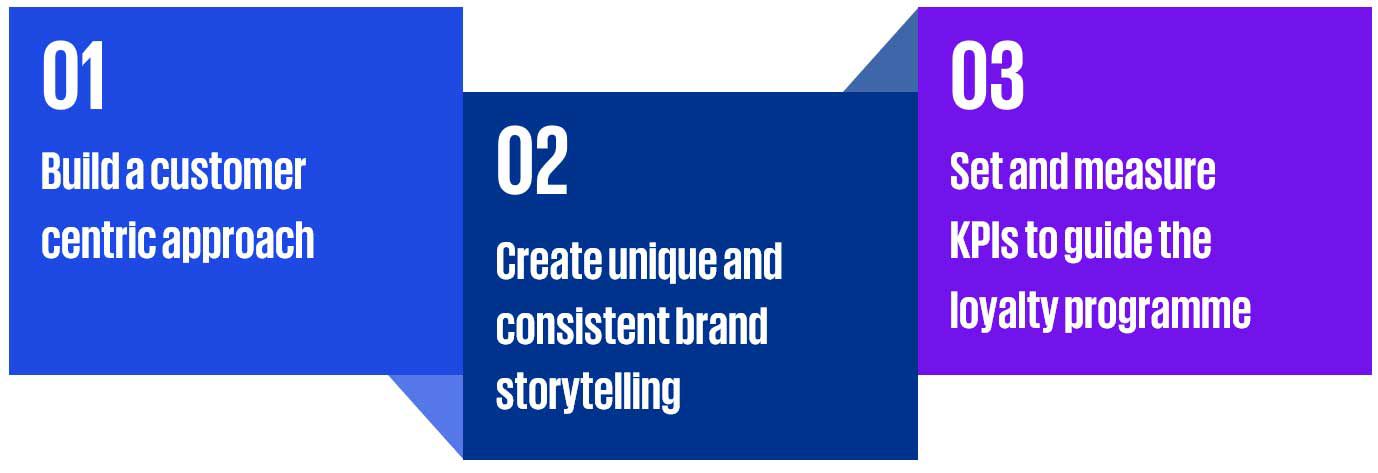In today’s ultra-crowded marketplace, brand loyalty is more valuable than ever to those businesses that inspire it. But, actually doing so is hard, and can be expensive.
One popular route gaining traction across sectors is the brand loyalty programme. Chris Brown and Ananya Sharma of our Strategy team explain how winning companies are investing significant time and resources into reimagining business models to unlock the power of consumer-centric, loyalty-orientated, data-driven growth, which is a powerful strategy across generations.
There’s no shortage of relevant metrics to substantiate the businesses case for loyalty. According to a recent study, customers who have an emotional relationship with a brand have a 306% higher lifetime value than those who don’t, while oft-quoted research by HBS suggests that increasing customer retention rates by 5% increases profits by 25% to 95%.
With insights like these, and new trends such as gamification and personalisation driving evolution in the global loyalty management market, it’s perhaps no surprise that some are forecasting it to grow to $18.2 billion in 2026, up from $8.6bn in 2021. Loyalty programmes aren’t only an opportunity to drive sales, however, but to grow overall customer engagement and platform stickiness that leads to a wide range of benefits such as enhanced consumer understanding, data capture, and customer evangelisation.
We believe that customer loyalty cannot be earned without a foundation of brand trust. Brands that have already invested in building high trust scores are much better placed to convert that trust into loyalty as customers seek authenticity and dependability in a sea of misinformation and fakery.
Brands that don’t have a foundation of trust, by contrast, are likely to find it harder to build loyalty in an era when growing number of consumers want to do business with brands that visibly embrace goals beyond the solely commercial.
Measuring returns on loyalty
Loyalty programmes cannot be built for free, of course. Engaging an outside provider or building an internal team to implement and run an effective programme is often a significant investment. Any business going down this route needs to be sure it’s worth it for them, which means instituting measurable KPIs from the start.
We suggest the following as a baseline: Customer Lifetime Value (CLV); Net Promoter Score (NPS); Customer Retention Rate. All too often, businesses invest resources in loyalty programmes without fully understanding the ROI they offer.
How can KPMG Strategy help?
The strategy division at KPMG Ireland offers a refined branding service for clients aiming to build new or assess existing brand loyalty programmes, as well as understand and measure their value, using the following analytical and creative approach:

Step 1: Build a customer centric approach
We start from a position of deep customer understanding, leveraging appropriate quantitative and qualitative research techniques to paint a detailed picture of your customers’ needs, aspirations, interactions with and understanding of your brand.
Step 2: Create unique and consistent brand storytelling
Based on our research, we develop a brand story that resonates with your customer base. We then communicate that story consistently across a revised customer experience that efficiently meets their needs to drive loyalty economics and fuel profitable growth.
Step 3: Set and measure KPIs
Whatever form your loyalty programme takes, we build in performance measurement from the beginning, elaborating appropriate KPIs to ensure you can understand its impact on critical metrics such as customer lifetime value, net promoter score, and customer retention rate. These allow us to form an accurate picture not only of customer behaviour but of its impact on the bottom line and, ultimately, programme ROI.
We recently worked with an Irish energy retailer to assess their current loyalty programme in comparison to national and international peers in the industry. We helped the organisation optimise the existing model by leading a comprehensive assessment. We brought insights on possible customer centric enhancements and revenue opportunities, including a revised rewards structure with adoption of fintech - supported by our in-house fintech experts.
Why KPMG Strategy?
At KPMG, relied upon globally to deliver the most confidential of services to thousands of clients, trust is a core value, and our approach to strategic branding reflects that. We understand that while durable brand trust may be reinforced by marketing, it is built on consistent, demonstrated performance.
As consumer preferences change, buying behaviours shift, and customer expectations rise, capturing customers' attention is challenging. With the changing relationship between brands and their customers, mergers & acquisition creating a brand overlap and the need for being more open-ended as a brand, there needs to be more than just a standard branding and marketing approach to stay ahead of the competition.
Our in-house approach that includes deep data analysis and in-depth experience will make sure to test every aspect of your customer’s experience and help you win your customers’ hearts and minds.
In addition, our wide experience across sectors and thousands of clients gives us an unrivalled bank of experience from which to test assumptions, benchmark performance, and hone strategic thinking. Leveraging KPMG's global stature and renown, we're positioned to help you amplify your brand globally.
If you have any queries on how to build brand trust in your business, please contact Chris or Ananya of our branding & marketing strategy team. We'd be delighted to hear from you.
Book a free consultation
Are you facing a challenge in maximising your marketing ROI?
We help CMOs and CEOs facing the challenge of converting traffic into leads that can eventually be nurtured into loyal customers. If this resonates, let's talk.
Christopher Brown
Partner, Head of Strategy
KPMG in Ireland


